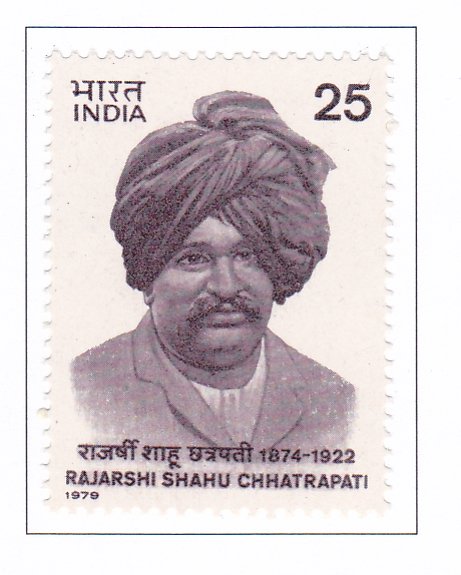Rajarshi Shahu Chhatrapati (1874-1922) Commemoration

Technical Data
| Date of Issue | May 1, 1979 |
|---|---|
| Denomination | 25 p |
| Quantity | 3,000,000 |
| Perforation | comb 13 |
| Printer | Security Printing Press, Nashik |
| Watermark | No Watermark |
| Colors | Dull purple |
| Catalog Codes |
Michel IN 787 Stamp Number IN 823 Yvert et Tellier IN 584 Stanley Gibbons IN 913 |
| Themes | Commemoration | Famous people | Headgear | Kings | Men | Reformers |
Rajarshi Shahu Chhatrapati, born on July 26, 1874, as Yeshwantrao, was the eldest son of Shrimant Jaysingrao, also known as Abasaheb Ghatge, the ruler of Kagal (Junior). His life took a significant turn when Maharaja Shivaji IV of Kolhapur passed away in 1883, and his widow, Maharani Anandibai, adopted Yeshwantrao, who later came to be known as Shahu Chhatrapati. Ascending to the throne of Kolhapur State at the young age of 20, Shahu Chhatrapati was a staunch advocate for the welfare of his people.
Believing firmly that administration should serve the people’s welfare, Shahu Chhatrapati embarked on his mission with determination and innovation. He continued the social revolution initiated by Mahatma Jyotiba Phule in Maharashtra, advocating for social equality and human rights. Taking practical steps to uplift the underprivileged and the weak, he abolished bonded labor and worked towards providing education and employment opportunities for the backward and depressed classes.
Shahu Chhatrapati sought to dismantle the caste system’s shackles and promote access to education and public offices for all citizens. He also aimed to curb child marriage and encourage widow remarriage. Introducing free education in Kolhapur and establishing hostels for impoverished children were among his initiatives. Through improvements in irrigation and the establishment of cooperatives, he played a pivotal role in initiating the first green revolution.
A champion of labor rights and the downtrodden, Shahu Chhatrapati envisioned a secular India based on social equality, liberty, and fraternity, aligning with the ideals enshrined in India’s present-day Constitution. His extraordinary liberalism, modernism, and foresight set him apart as a social revolutionary, a true democrat, and a visionary leader. A patron of theater, music, and sports, he was a prince of the masses.
Sadly, Shahu Chhatrapati passed away in Bombay on May 6, 1922, at the premature age of 48. Nevertheless, his legacy as a multifaceted personality who envisioned and acted ahead of his time continues to inspire generations.
